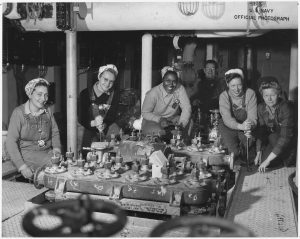Each year I endeavor to start anew with a fresh, positive outlook. I wish that for you, as well. Each of us has to navigate our private, personal struggles as well as the macro challenges that we are confronted with as a community. War, death by guns, food insecurity, climate change, racism, sexism, antisemitism, homophobia, Islamophobia, and on and on. Typing this list is depressing in itself but much more so when I reflect on where we are globally as compared with say, January of 2009. So, I have tried to follow the adage and stay silent as I do not have much to say that is very ‘nice.’ Having to fight back against a relentless assault on democracy, equity, justice, inclusion, diversity, and access is not nice. It is not easy. It is not cheerful. It is exhausting and depressing to have to fight against those who are intent upon dragging us all back to the good ‘ole days when only a small percentage of people had any rights at all.
I am not trying to ruin 2024 for you, I am actually trying to encourage you. I do not have to cite any recent events (unless you have been fortunate enough to have been completely unplugged for the past three or four weeks) for most of you to think “Here we go,” and then, perhaps let out a sigh of resignation.
The arguments against diversity, equity, inclusion, and access are old tired screeds that had no basis in reality when they were hurled by ultra conservatives in the 1990s and have no basis in reality now. Based on substantial research data and results, we know that we do better work when we work with diverse groups of people. We know that people with diverse experiences, perspectives, and communications styles think differently, resulting in problems being solved more rapidly and especially, more effectively by diverse groups. We know that the more education people have, the less likely they are to experience unwanted pregnancy, poverty, and violence. We know that creating equal access (true equal access) brings engagement, success, and joy—actual joy to people in their work and in their studies!
So, why are those who yell the loudest being given so much bandwidth? Why are their distortions of the truth being repeated by well-meaning intelligent people on social media and across the dominant media outlets? Why are public and private institutions making bad decisions about how to effectively manage free speech and remain committed to being diverse, inclusive, and accessible?
Because bullies win by yelling and making a lot of noise—bluster. Bluster is distracting and upsetting and very effective at keeping us from doing the critical work that we must continue to do.
My resolution for 2024: remain focused. Focus is a critical function when there are those intent on distraction us. Disturbing us. Ultimately, disappearing us. Every fascist regime throughout history has silenced those fighting to save democracy—journalists , academics, advocates, and activists—by disappearing them.
We will not be disappeared. I will not be disappeared. I know that silence equals death. In that knowledge comes the understanding that I must speak up. I am not talking about having an urgent need to express my thoughts and opinions. I must speak up as a witness, advocate, ally, and activist. I have been in this space of speaking up for those who have been silenced since I was a child and so, If I cannot speak up, who can?
We are a diverse nation. We are a diverse planet of people. We need each other to thrive or none of us thrive. Those who seek to rob our inclusion, equity, access, and value know this and so they will do their best to divide us—create wedges between us based on our differences—and conquer us. This is also a very old tactic. It is a very effective tactic and that is why it is dusted off and used again and again by those seeking to rob us of our rights to vote, to speak, to pursue happiness. They twist words and meanings to confuse and diminish their effectiveness. They state things that they know are patently untrue and wait for the bickering and debating to keep everyone distracted and then chip away at laws—rights and protections—that took centuries to attain.
Yesterday I was speaking with my dear friends Derrick Kikuchi and his husband Craig Wiesner (owners of Reach and Teach and activists for social equity and justice as well as providers of a sanctuary that gives us “hope that does not disappoint”), and they reminded me that I am not alone.
As a practitioner of EEO/DEIBA one can feel isolated, targeted, and alone. We need to remind ourselves and each other that we are not alone. I am here for you. You are here for me. We are here together fighting the good fight, doing the important work.
Maintaining focus is absolutely critical. It is hard to keep our focus when we are distracted, or disturbed, silenced or disappeared by bullies yelling lies and threats. I will stay calm and speak the truth. I encourage you to do the same.
This is not about politics. This is about protecting ourselves, our planet, and the future.
If you need an affirmation or reminder as to why you must continue to do this work that is exhilaratingly exhausting, please reach out. I am here for you—with you—as your ally, advocate, and friend.
Wishing you peace, love, joy, and inclusion in 2024, and beyond!
~ Wendy
Wendy@InclusionStrategy.com
Inclusion Strategy Solutions LLC
January 10, 2024



